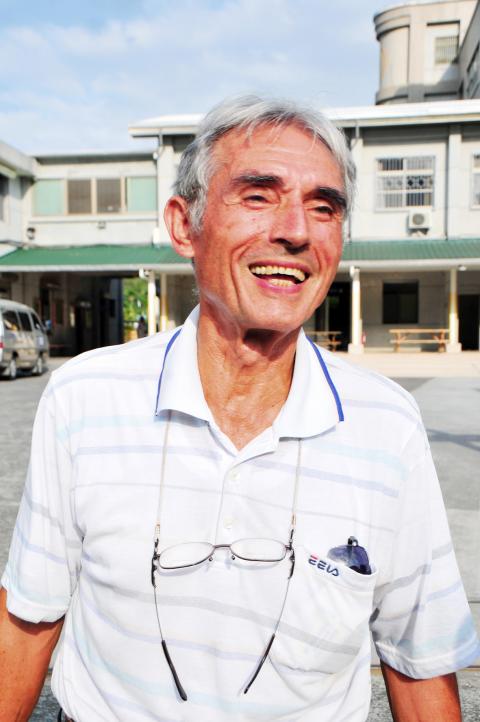The regulation concerning the criteria for foreigners with professional skills to obtain Republic of China citizenship, without being required to renounce their original citizenship, is to be promulgated today, the Ministry of the Interior announced.
The ministry is to promulgate today the regulation, which is in accordance with and supplementing an amendment to the Nationality Act (國籍法) passed by the legislature in December last year that states foreign nationals may be exempted from submitting a certificate of loss of original nationality if “they are high-level professionals in the technological, economic, educational, cultural, art, sports, or other domains who have been recommended by the central competent authority.”
Foreigners with five years of residency and specific professional qualifications in six specified categories can be granted citizenship without renouncing their prior citizenship, it said.

Photo: Hua Meng-ching, Taipei Times
The amendment does not apply to Chinese citizens or residents of Hong Kong or Macau, as their naturalization falls under the purview of the Act Governing Relations Between the People of the Taiwan Area and the Mainland Area (臺灣地區與大陸地區人民關係條例), it said.
The professional categories included in the regulation are technology, economics, arts and culture, education, sports and “special,” the ministry said.
The technology category includes experts in high-value technical fields such as nanotechnology, optoelectronics, information technology, biotechnology, military science and technology, artificial intelligence, robotics and other cutting-edge technologies.
The economics category includes those with technical skills or knowledge of subjects that could contribute to the upgrading of industry, such as those involving semiconductors, biomedical technology, “green” energy, cultural industries and tourism.
The arts and culture category includes those who received recognition from distinguished institutions or major media outlets; have served on the panels of major arts and cultural prizes; accomplished preservers or restorers; or outstanding performers.
The educational category includes foreigners who are employed at a Taiwanese academic institution with a rank of assistant professor or above and those who have published in internationally renowned academic journals.
The sports category includes athletes who have finished in the top three places in international competition, national team coaches, international referees and distinguished players.
The special category includes distinguished democratic, human rights and religious advocates; those who have authored major works of literature; those who have received international honors or distinctions; and those with a recognized contribution to finance, medicine, transportation, telecommunications, aviation and navigation, meteorology, earthquake studies and popular culture.
French Catholic priest Yves Moal — also known as Liu Yi-feng (劉一峰) — yesterday said he is heartened to be able to be a citizen of both Taiwan and France.
Moal, 76, said he has served the Catholic Church in Taiwan for the past 51 years and has since 1986 managed a Hualien-based charity for mentally challenged children, works that have earned him a Presidential Office commendation.
“Taiwan has been my home for a long time. I spend almost twice as much time in Taiwan as in France, and I will be more than happy to live out my old age in Taiwan,” Moal said, adding that he expects to receive his national identification card next week.
Additional reporting by Hua Meng-ching

The Ministry of Foreign Affairs (MOFA) yesterday said it is closely monitoring developments in Venezuela, and would continue to cooperate with democratic allies and work together for regional and global security, stability, and prosperity. The remarks came after the US on Saturday launched a series of airstrikes in Venezuela and kidnapped Venezuelan President Nicolas Maduro, who was later flown to New York along with his wife. The pair face US charges related to drug trafficking and alleged cooperation with gangs designated as terrorist organizations. Maduro has denied the allegations. The ministry said that it is closely monitoring the political and economic situation

UNRELENTING: China attempted cyberattacks on Taiwan’s critical infrastructure 2.63 million times per day last year, up from 1.23 million in 2023, the NSB said China’s cyberarmy has long engaged in cyberattacks against Taiwan’s critical infrastructure, employing diverse and evolving tactics, the National Security Bureau (NSB) said yesterday, adding that cyberattacks on critical energy infrastructure last year increased 10-fold compared with the previous year. The NSB yesterday released a report titled Analysis on China’s Cyber Threats to Taiwan’s Critical Infrastructure in 2025, outlining the number of cyberattacks, major tactics and hacker groups. Taiwan’s national intelligence community identified a large number of cybersecurity incidents last year, the bureau said in a statement. China’s cyberarmy last year launched an average of 2.63 million intrusion attempts per day targeting Taiwan’s critical

‘SLICING METHOD’: In the event of a blockade, the China Coast Guard would intercept Taiwanese ships while its navy would seek to deter foreign intervention China’s military drills around Taiwan this week signaled potential strategies to cut the nation off from energy supplies and foreign military assistance, a US think tank report said. The Chinese People’s Liberation Army (PLA) conducted what it called “Justice Mission 2025” exercises from Monday to Tuesday in five maritime zones and airspace around Taiwan, calling them a warning to “Taiwanese independence” forces. In a report released on Wednesday, the Institute for the Study of War said the exercises effectively simulated blocking shipping routes to major port cities, including Kaohsiung, Keelung and Hualien. Taiwan would be highly vulnerable under such a blockade, because it

Conflict with Taiwan could leave China with “massive economic disruption, catastrophic military losses, significant social unrest, and devastating sanctions,” a US think tank said in a report released on Monday. The German Marshall Fund released a report titled If China Attacks Taiwan: The Consequences for China of “Minor Conflict” and “Major War” Scenarios. The report details the “massive” economic, military, social and international costs to China in the event of a minor conflict or major war with Taiwan, estimating that the Chinese People’s Liberation Army (PLA) could sustain losses of more than half of its active-duty ground forces, including 100,000 troops. Understanding Chinese